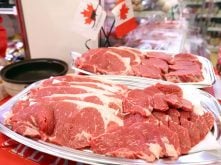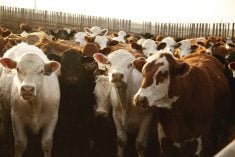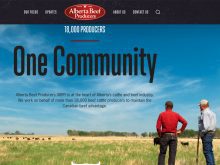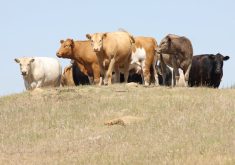The Canadian Cattle Young Leaders program pairs 16 people ages 18 to 35 with an industry leader in their area of interest
A 21-year-old cattle producer who wants to take the beef industry to the next level is getting help from a national mentorship program.
“It’s an industry that hasn’t changed much in the last 100 years,” said James Kinley at the 141-year-old Bar U Ranch National Historic Site near Longview south of Calgary.
“And every operation is different, but yeah, I think the industry is definitely open to a lot of change and you can see it with the upcoming generations. Everyone’s always really interested in what’s next… and I think the future of the beef industry is really bright in that respect.”
Read Also

Saskatchewan dairy farm breeds international champion
A Saskatchewan bred cow made history at the 2025 World Dairy Expo in Madison, Wisconsin, when she was named grand champion in the five-year-old Holstein class.
Kinley was a participant in the Canadian Cattle Young Leaders Spring Forum, which was recently held in the Calgary area. The three-day event included tours ranging from cow-calf farms and ranches to feedlots and a processing facility, along with networking events and learning sessions.
It is part of the Canadian Cattle Young Leaders program, which pairs 16 people ages 18 to 35 with a beef industry leader in their area of interest, for a nine-month mentorship. The program includes a travel budget of $2,000 for each participant, allowing them to visit their mentor and go to events.
“You’d be silly not to (apply) if you’re interested in agriculture,” said Kinley. “It’s a pretty amazing program, the opportunities and the people that you meet out here… I’m only 21 years old and I knew that when I get a bit older, I’d get married to my farm, so I figured I’d better do this now.”
The program was established in 2010 by the Canadian Cattle Association to help the beef industry remain strong and profitable, said youth leadership co-ordinator Jessica Radau.
“And that’s hard to do if you don’t have a next generation to continue the work that you’re doing and grow upon it…. You need young leaders who are going to step up and be engaged, and we have to create some positivity and excitement about our industry as well to make sure that we have young people taking this on.”
A recent briefing paper by the University of Calgary detailed the concerns of a beef industry focus group held last July about the challenges facing the sector. It said participants were concerned about how to encourage younger generations to work in the industry in the face of obstacles, such as high start-up costs and low financial returns.
As part of the forum, a reception for about 50 people was held at the Bar U Ranch on May 31 to honour the program’s sponsors. The ranch dates back to 1882 when Alberta was still part of the Northwest Territories, making it a reminder of the beef industry’s early cowboy days of the open range before barbed wire fences.
As someone from a cow-calf and sheep farm near Cartwright, Man., who occasionally raises chickens and pigs, Kinley is pursuing a bachelor degree in agriculture technology at Lakeland College in Alberta. He recently spent several weeks working for OneCup AI, which has created an artificial intelligence system that uses facial recognition technology to monitor livestock.
It does everything from tracking animal growth and evaluating nutrition for more efficient feed rations to detecting potential health problems such as lameness or disease outbreaks.
“They know every single thing about their animals, so applying stuff like that to beef farming is something that’s really interesting to me,” said Kinley.
His mentor is Shylo Penrod, who is the manager of Rimrock Feeders near High River, Alta. Although Rimrock Renewables Ltd. plans to create a biodigester to process the feedlot’s manure to create renewable natural gas, the project is opposed by town and area residents who are concerned about the potential smell.
“I think a biodigester is a wonderful thing for the industry,” said Kinley. “I think that’s really the next step of what’s going to push the beef industry into being the next sustainable thing in Canadian agriculture.”
Danika Mayer, 26, successfully applied to the program after seeing an ad on Facebook, although she didn’t think she had any chance of being accepted. She is a registered practical nurse and first-generation farmer who runs a small seed stock operation east of Ottawa near Alexandria, Ont.
Mayer and her partner, John Jamieson, don’t have a family farm they can take over, so they’re starting from scratch. She hopes to learn about rotational grazing from her mentor, Sandra Vos, who runs a small cow-calf operation in Brant County near Brantford, Ont.
“I do think it is a sustainable method to raise cattle…. The funny thing is, she’s actually a nurse as well, and a first-generation farmer, too, so they matched us up perfectly. It was just awesome.”
Although Mayer doesn’t describe herself as a city person, she also doesn’t come from a ranching background.
“So, it’s just interesting hearing about the challenges that (Vos) had learning about agriculture and making her own hay, raising her own cattle, calving them out and the challenges that she’s faced like that….
“It’s really interesting to hear from her point of view because she’s not stuck in the mindset that, ‘well, we’ve always done it this way, this is how we’re going to do it,’ She’s very open to innovative ideas and things like that.”
For more details about the program, visit canadiancattleyoungleaders.ca.
















